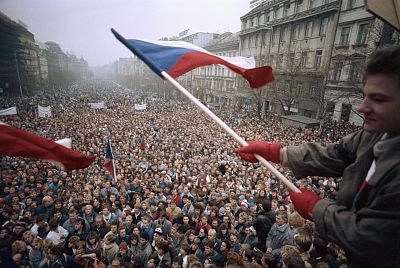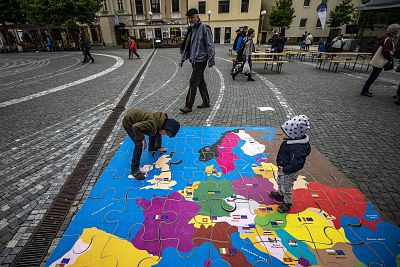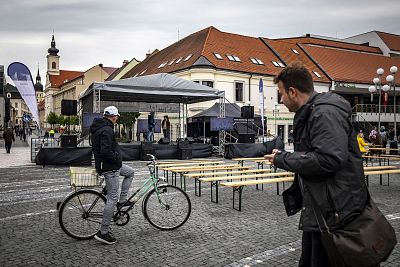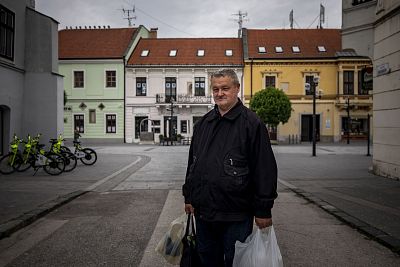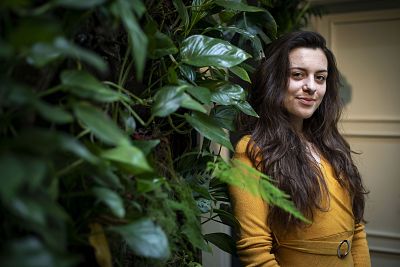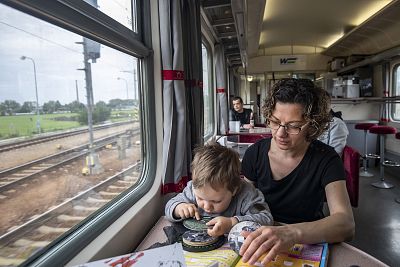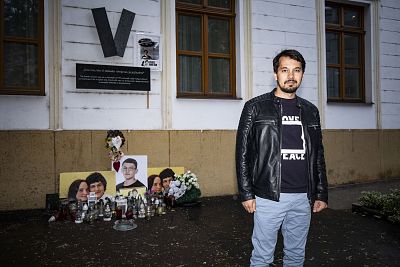"My aim is to double the turnout to around 25 percent. People laugh, they don't believe it's possible."
TRNAVA, Slovakia — Slovakia is dealing with a peculiar kind of apathy.Just 30 years after the Velvet Revolution spelled the end of communist rule and brought democracy to what later became Slovakia, only around 1 in 8 voters made their voices heard during the last European Parliament election.As around 373 million people across the continent prepare to cast ballots again beginning Thursday, the question of why Slovaks don't bother to exercise that right is a conundrum for some in this landlocked country."I remember how we lived 20 years ago," Jano Zitnansky, 35, who works in information technology, said. "My family was poor and they're not now — but people have short memories."
Peter Martini, 68, a former military driver who was stationed near the border between Austria and what was then Czechoslovakia, agreed."I appreciate that I get a choice now. Under communism there was only one party," he said.But since joining the European Union in 2004, Slovakia has consistently had the lowest voter turnout when the bloc elects lawmakers to its Parliament, which shares time among Brussels, Belgium, and Strasbourg, France.Just 13.05 percent voted during the last E.U. elections in 2014. Across the 28-country bloc, the average turnout was 42.61 percent. Voting is compulsory in members Belgium, Bulgaria, Cyprus, Greece and Luxembourg.And only 6 percent of Slovaks aged 18 to 24 voted then — compared to 28 percent overall E.U.-wide.
"It's horrible, I know, but I'm one of them," said Jakub Švajka, 20, referring to the statistics showing the sheer number of nonvoters while sheltering from the rain at a shopping mall in the capital, Bratislava.Švajka admitted that he didn't care about European politics and didn't plan to vote this week.In the United States, some 61 percent of those eligiblevoted in the 2016 presidential election, according to the Census Bureau, while some 53 percent turned out for last year's midterms.An uphill battleIt's people like Švajka that E.U. officials are hoping to win over.A nationwide campaign to encourage Slovaks to get out and vote visited 17 towns and cities across the country that's home to around 5.4 million people."My aim is to double the turnout to around 25 percent," said Ladislav Miko, the head of the representation of the European Commission in Slovakia. "People laugh, they don't believe it's possible."But in the small historic city of Trnava, northeast of Bratislava, only a handful of hardy locals braved the unseasonable biting winds to attend a recent event promoting the elections.Most of those who did show up to the "European roadshow" said they had already decided to vote in the Parliament elections — not the event's target audience."In Slovakia, people think about, 'my village, my garden, my home,' that's really it. They don't think about the European elections," explained Lucia Valentovičová, who was walking with her daughter and sister down a main street and decided not to attend.
Later, at an indoor discussion about the elections and what the E.U. does for Slovakia, eight elderly people nodded as officials ticked off the benefits of the country's membership in the bloc."Normally, it's not this bad," said Miko, who explained that in other cities when the weather was kind, they could have up to 1,000 attendees.The blame gameSome Slovaks complain that the E.U. feels remote and had little impact on their daily lives. Others accused lawmakers of being self-interested and not concerned about problems in Slovakia.Civil servant Jana Čaklošova, 54, is not planning to vote."The politicians don't work for Slovaks. They just sit in Brussels and earn money," she said from a Starbucks in Bratislava.
Candidates and political parties admit the European Parliament elections had traditionally not been a priority here. The only giveaway an election was happening was a smattering of campaign billboards alongside main roads."Put simply, politicians and political parties ever since we acceded to the European Union in 2004 have largely tended to ignore this election," said Vladimír Bilčík, a candidate on the list of a coalition of President-elect Zuzana Čaputová's Progressive Slovakia partyand the Together — Civic Democracy party."What we're doing differently this time is, we're doing a lot of face-to-face campaigning," he said. "We are trying."
Iveta Radičová, a former prime minister of Slovakia, told NBC News that many voters felt there was little reason to vote in European Parliament elections."Nothing will change ... what can 13 deputies do in Parliament? Nothing," she said, highlighting that her country has only a small fraction of the legislature's 751 seats.Radičová said she had been left uninspired by the campaign and said that she will likely not vote.#embed-20190314-eu-facts iframe {width: 1px;min-width: 100%}
The majority of Slovaks say they feel "very" or "fairly" attached to the European Union, according to European Commission statistics. But on the streets of Bratislava and Trnava, many said they believed that Central and Eastern Europeans were regarded by second-class citizens by people living elsewhere in the bloc. Others expressed complaints about the differences in the standard of living across the E.U.The average gross annual earnings of full-time employees in industry and services in 2011 was 42,900 euros in Germany and 45,793 euros in the Netherlands, compared to 10,788 euros in Slovakia, according to the latest available official figures.Others pointed to alleged government corruption as a factor that weighs heavily on Slovakia's national psyche. The country comes 26 out of 31 European states on a global ranking of perceived levels of public sector corruption, in a report from the Berlin-based charity Transparency International."Everyone knows if you want some E.U. funds, you have to bribe someone," said fishmonger Patrik Sirotka, explaining why it felt pointless to vote. "It just goes into their pockets," he added, referring to Slovak lawmakers.The crisis in confidence in Slovak politics reached boiling point last year when investigative journalist Ján Kuciak, who was digging into possible government corruption, was shot dead along with his fiancee, Martina Kušnírová.The murder triggered tens of thousands of people to protest and the subsequent collapse of the Slovak government.
Čaputová, an anti-corruption activist who had taken to the streets alongside the demonstrators, became the country's first female president-elect in March.Many hope Čaputová's victory will propel Slovaks to get out and vote this week. In the country's 2016 parliamentary elections, 59.82 percent of eligible voters turned out, according to official figures.Juraj Šeliga, 28, is co-founder of For a Decent Slovakia, the political movement that organized the protests.He has turned his attention to encouraging people to vote this week and believes that 20 percent turnout is possible.
"What happened after the murder of Ján and Martina is that Slovakia woke up and people started to be more interested in politics," he said. "They were watching what was happening they were coming into the protests and talking about politics."The polarized electoral field and rise of the anti-establishment and far-right People's Party Our Slovakia, which some polls predict could win as much as 12 percent of the vote, may also play a role in boosting interest.World news
"There are two parts of Slovak society and both has a quest for change," said Ol'ga Gyárfášová, of Comenius University, pointing to a European Union poll that found that 20 percent of Slovakssaid they were "very likely" to vote in the looming election."That's still very low compared to other countries but for Slovakia's conditions, it would be a major increase in electoral turnout," she added.












